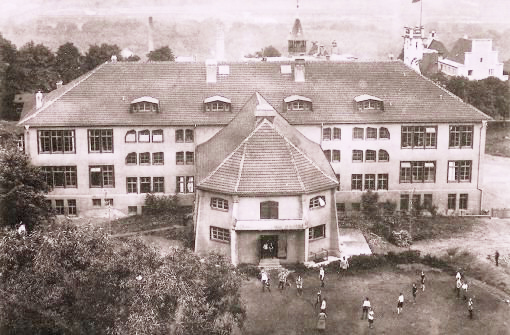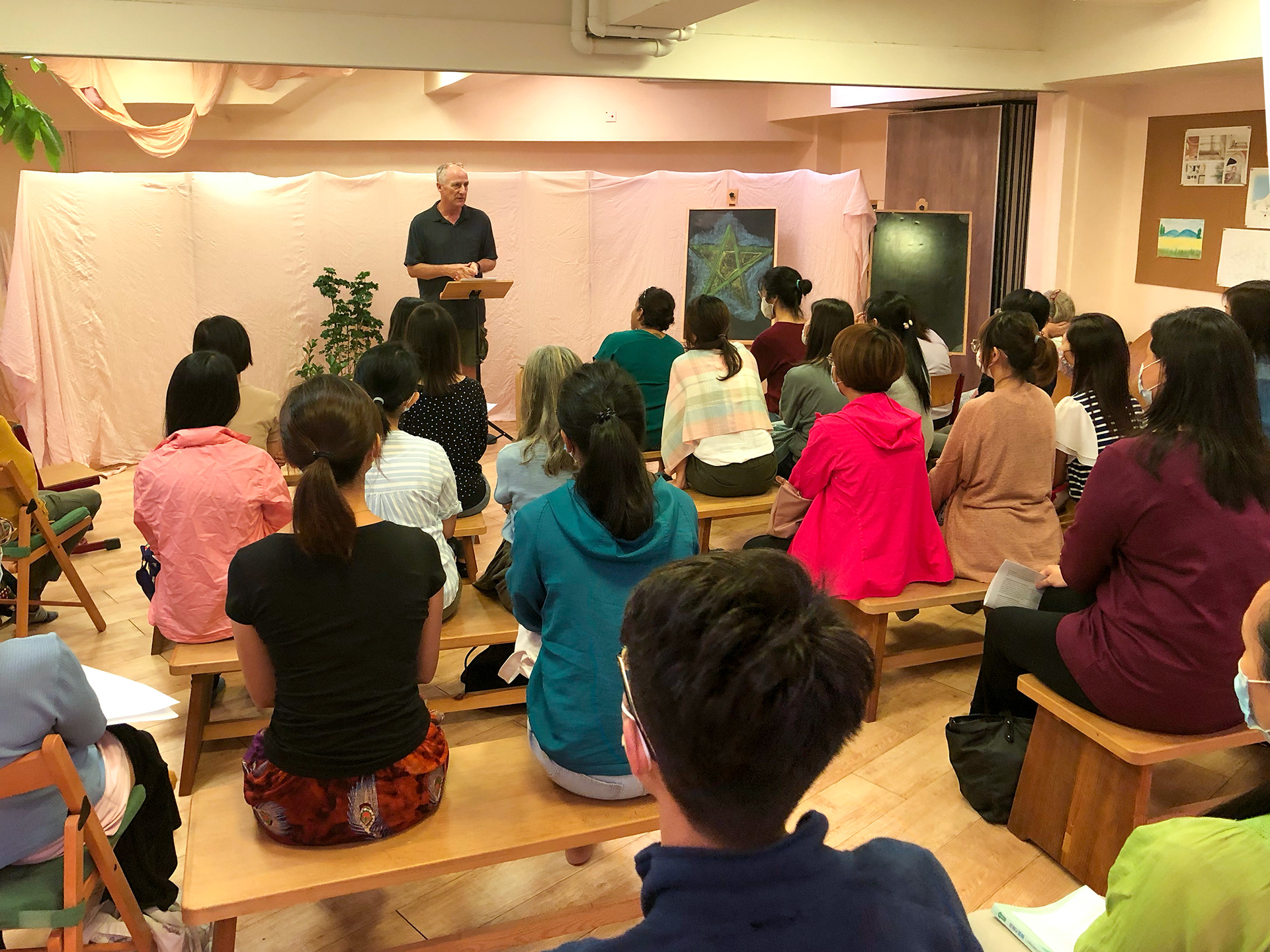Meeting notes prepared by Ice Aguinaldo-Cristobal
The Island Waldorf Teacher Training opens its doors to anyone interested to:
- Experience the “best job in the world”
- Help young human beings grow and support them towards realizing their full potential
- Embark in an individual journey of continuous professional and personal development towards becoming the highest version of oneself in this lifetime.
Sharon Tsui and Philip Beaven launched the Island Waldorf School’s Steiner Waldorf Teacher Training on May 22, 2020 in Kennedy Town. Some 30 parents, educators, and interested participants attended the introductory talk about the program. Sharon is one of the founders of the Island Waldorf School while Teacher Philip, the school’s current Class 3 teacher, will be one of the tutors in the teacher training.
The roots of Waldorf education
Teacher Philip led the audience to a brief time travel as he talked about the first founding of the first Waldorf School, 100 years ago. The Waldorf movement began with Emil Molt’s question to Rudolf Steiner about the possibility of providing the kind of education the children of his Waldorf Astoria cigarette factory employees’ post-WWI.

What is very special about Waldorf Education is that: it looks at the child’s specific development; it has deep understanding of the patterns of the children’s development; and ultimately it is anchored on the development of the consciousness of humanity as a whole. Waldorf educators view the child not as an empty vessel that needs to be filled with knowledge, but as a plant that develops at its own phase given the right environment – rich soil, water, and the warmth of the Sun. It is through providing these optimal conditions that the seed sprouts, grow its leaves, blossom, bear fruit, and plant seeds for future generations. The child as a seed already has an individuality that will awaken at the right time and in the right environment. Like this image, the Waldorf education supports the child’s incarnation and gradual blossoming. Each child will have their own special riddles that teachers need to solve, which can also manifest in behavioral issues that need to always be met with patience, deep insights, and most of all, LOVE.

What is it being a Waldorf teacher?
Teacher Philip describes it as the “best job in the world.” While the word “job” may easily be associated with successes measured by one’s financial freedom and material possessions, there is so much more that this “best job in the world” offers. Imagine getting paid and having a great sense of fulfillment, while continuously developing one’s self – a continuous professional and personal development. As a Waldorf Class Teacher works with the children from Class 1 to 8, this becomes such a rich, immersive experience allowing the teacher to constantly work on human problems and issues. In this aspect, the children actually become the teachers’ greatest teachers. The Waldorf teachers need to be prepared to constantly change. Teacher Philip also highlighted how imagination is very important in carrying out Waldorf Education from Class 1 to 8. Teaching can be considered as the highest of arts, as the material being worked on are the children; the teacher’s art is helping human beings grow. By helping the children grow, the Waldorf Teachers also grow. The possibility of becoming the highest version of ourselves in our lifetime, this in itself, is probably the best job we could ever imagine having in this world.
It is notable that the first Waldorf teachers, invited by Steiner to carry on with this special task, did not have prior solid training or background about this special kind of education: Waldorf Education is not so much about what the teacher knows, but “who the teacher is.” This is what the Island Waldorf Teacher Training is precisely about – it is embarking in a journey to know oneself deeper, so that through imagination, inspiration, and intuition the teacher is able to meet the children’s specific developmental needs.
Learning to become a Waldorf teacher

Learning the methodologies of teaching or carrying out specific curriculum is not enough. The Island Waldorf Teacher Training program will necessarily have a Foundation in Anthroposophy component, which involves studying specific works of Steiner from which Waldorf Education is anchored on, and also immersing in artistic activities. Steiner, himself, said that artistic experiences enable deeper understanding of the knowledge he shared through his works, far deeper than what intellectual discussions could ever accomplish. These activities will be done in the morning, while afternoon sessions will delve on the curriculum-specific topics and activities for Class 1-8.
This will be two-year learning journey, meeting on certain Saturdays of the month and with some intensive sessions that will have to be run in consecutive days (see schedule for details). The third year will be a full-year, in-service learning when students will have the opportunity to observe, be mentored, and eventually experience handling the class.
Our highest endeavor must be to develop free human beings who are able of themselves to impart purpose and direction to their lives. The need for imagination, a sense of truth, and a feeling of responsibility – these three forces are the very nerve of education. – Rudolf Steiner
Q&A
- Who are the tutors?
- See tutors’ biography.
- What does having sound skills mean?
- Having received prior education should allow us to have basic literacy and numeracy skills necessary, but of course we will need to develop various skills on how to carry them out in the class imaginatively.
- Course Fee?
- See our fees; the Teacher Training course already covers the Foundation in Anthroposophy.
- Are there make up classes offered?
- 90% attendance is necessary, and it is individual responsibility to catch up with classmates and study lessons missed. Note this course has no formal qualifications.
- Are there required monthly assignments?
- As the course has no formal qualifications (eg. Highgate’s Early Years Educator Teacher Training Course is a UK CACHE Level 4 Certificate Course, which requires formal monthly written assignments to be submitted). See question 10 on the FAQ.
- What are the requirements to be a teacher?
- See different requirements per country. This IWTT is not yet accredited.
- Can we visit classes?
- This is for Year 3 – 5 to 6 placements during the course of the year; 3-4 weeks in the Lower to Middle School Classes (6-14 year olds) during Main Lesson period. See about Year 3 at Course Structure. For those who want to visit classes and experience them, they can do so during regular School Tours when the school allows participants to observe a class for 15 minutes.
- What if I only wanted to be a Subject Teacher?
- The course is not teaching students how to be a Subject Teacher, but the foundations and also the specific lessons how to carry out the curriculum will give the student a holistic view, foundational knowledge, and experience that will give him or her inspiration on how best to carry out the specific subjects. What is most important is understanding children’s development and what’s behind this educational experience.
- What are the required readings?
- Steiner’s works: Theosophy, Occult Science, Taking Charge by Gudrun Burkhard, and Foundations of Human Experience (second year)
- Will the course include new research/new methodologies?
- Course is not about the curriculum/methodologies – there is no rulebook, but of course we will also learn how to “localize” lessons according to the children’s needs. What we will learn is what is right for the class, developing that feeling for the right way, given the children’s development. What you will find is that our teachers also creatively introduce mainstream methodologies in a very Waldorf way. It’s developing sensitivity to make specific choices in the classroom that will meet the children’s individualized, specific needs.
- What does Teacher Philip like/dislike about being a Waldorf teacher?
- Dislike most is that being older he inevitably has less energy than when he was younger. What I got that he liked most is that the endless possibility of learning and developing as an individual, through his experience of teaching and meeting the children’s needs. Being a teacher is a calling.
- What is Sharon’s mission in bringing Waldorf to HK?
- Provide another alternative education to Hong Kong children.
- Do you have numbers on how many you can accommodate for Year 3 (placements)? Is there a maximum?
- IWS is working on partnering with Starhill and Forest House. Although Teacher Philip can imagine that if they had 30 students seeking placements for Year 3, then it will be tough to provide that within Hong Kong.

